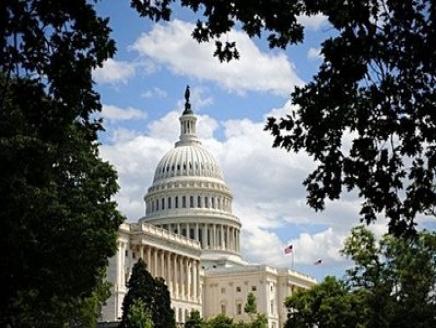اضيف الخبر في يوم الإثنين ٠٧ - مارس - ٢٠١١ ١٢:٠٠ صباحاً.

White House promotes Muslim help against terrorism
With tensions rising in the debate about terrorism and radicalization within the Islamic community, the White House is trying to lay the groundwork for tolerance, cooperation and a universal "American" desire to thwart violent extremism, regardless of religious beliefs.
President Barack Obama sent his deputy national security adviser, Denis McDonough, on Sunday to a Washington-area mosque known for its cooperation with the FBI and its rejection of the al-Qaeda brand of Islam.
The timing of the speech was significant - just four days before a controversial congressional hearing on Islamic radicalization. Speaking to an interfaith forum of Muslims, Christians, Jews and other faiths, the president's point-man on countering violent extremism was clear: "We're all Americans."
- Call for a peaceful demonstration in front of the White House
- My Speech in city council in Norwich on 13/09
- The New best ways to overcome Terrorism
- Democracy And Terrorism
- About Ending Peacefully the Culture of Wahabi Terrorism and Crusades-Like Terrorism
- The Camp of Goodness Which Is against Terrorism
- The Reasons of Why Terrorism Arises in Particular from the Muslim Immigrants in the West
- The Roots of Terrorism in the Saudi Wahabi Doctrine and the Muslim Brotherhood Terrorist Organization
- Islam is against Muslim Wahaby terrorists
The majority of the recent terror plots and attempts against the U.S. have involved people espousing a radical and violent view of Islam, making it difficult to ignore the role religion plays in this particular threat. But focusing too closely on Islam and the religious motives of these attempted terror attacks also threatens to alienate an entire community that has nothing to do with these violent beliefs.
"Sufficient cooperation"
Republican Peter King of New York, chairman of the House of Representatives Homeland Security Committee that is holding the hearings, thinks the Muslim community can and should do more to help law enforcement thwart these attacks.
"I don't believe there is sufficient cooperation" by American Muslims with law enforcement, King said Sunday on CNN. "Certainly my dealings with the police in New York and FBI and others say they do not believe they get the same - they do not give the level of cooperation that they need."
King later told The Associated Press that he agreed with the deputy national security adviser.
"This is a real threat," King said. "We can't have false hope and false comfort."
Two of the witnesses scheduled to testify Thursday are relatives of men who were radicalized and turned to terrorism. One is the uncle of a Somali man from Minneapolis - Burhan Hassan - who left the country in December 2008 to join a terror group in Somalia. The family believes Hassan was killed and buried in Somalia.
Another witness is the father of Carlos Bledsoe, who prosecutors say shot and killed a soldier at a military recruiting center in Arkansas in 2009. Bledsoe grew up in the Memphis, Tennessee, area, converted to Muslim and changed his name to Abdulhakim Mohammed.
McDonough said Muslim Americans are not the problem, but part of the solution.
"No community can be expected to meet a challenge as complex as this alone," McDonough said. "No one community can be expected to become experts in terrorist organizations, how they are evolving, how they are using new tools and technology to reach our young people."
Law enforcement
The Muslim community has been integral in tipping off law enforcement in many of the plots uncovered over the past two years. In 2009, the Muslim community came forward when they learned five Northern Virginia men had traveled to Pakistan with the hopes of joining a terrorist organization.
McDonough said agencies throughout the Obama administration would continue working to understand the process of radicalization. He also promised further outreach to Islamic communities in the United States, as well as efforts to dispel "misperceptions about our fellow Americans who are Muslim."
Some 300 protesters gathered in New York's Times Square on Sunday to speak out against the planned congressional hearing, criticizing it as xenophobic and saying that singling out Muslims, rather than extremists, is unfair.
In all its efforts, the Obama administration faces the same challenge as the Bush administration of whether to identify religion as part of the motive for attacks on the U.S., said Stewart Baker, a former senior Homeland Security official.
"If you don't, then it's a very abstract discussion of why terrorism is bad," Baker said. "If you do, you raise the profile of religion in ways that makes Americans uncomfortable. That concern hasn't gone away in the new administration - if anything, it's stronger."
King's critics, including the first Muslim elected to Congress, Democrat Keith Ellison, say it is wrong to single out a religion.
"We're concerned about the breadth of this," Ellison said on CNN Sunday. "To say we're going to investigate ... a religious minority, and a particular one, I think is the wrong course of action to take."
But King isn't the first lawmaker to convene a congressional panel on the topic. Radicalized Muslims have been the centerpiece of most of the Congressional hearings on violent extremism held since the Sept. 11, 2001 terror attacks. Some lawmakers have avoided using specific terms about Islam in the title of the hearings. But after a few sentences into the committee chairs' opening statements, it's clear that the focus is on people who have been influenced by radical Islam.
دعوة للتبرع
علمه تعالى للغيب: سبق و شرحت مشكور ا معنى الغيب في القرا ن ...
أبى يضربنى : ارجوك يا استاذ احمد عايزك فى مشكلة انا عندى 17...
سليمان وسبأ من تاتى : يعني حسب مقالة عمر علي محمد "قصة سليما ن" فأن...
أربعة أسئلة: السؤ ال الأول : بينم ا اتصفح الفيس بوك...
شكرا جزيلا: فرق شاسع بين تشريع الرحم ان جل وعلا...
more
